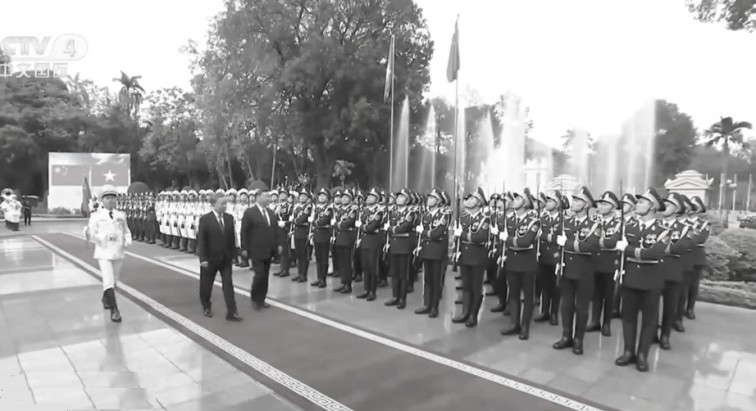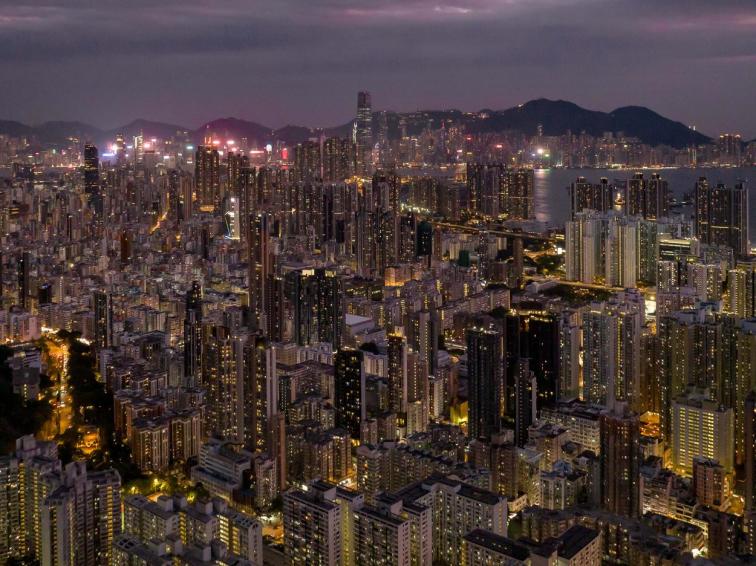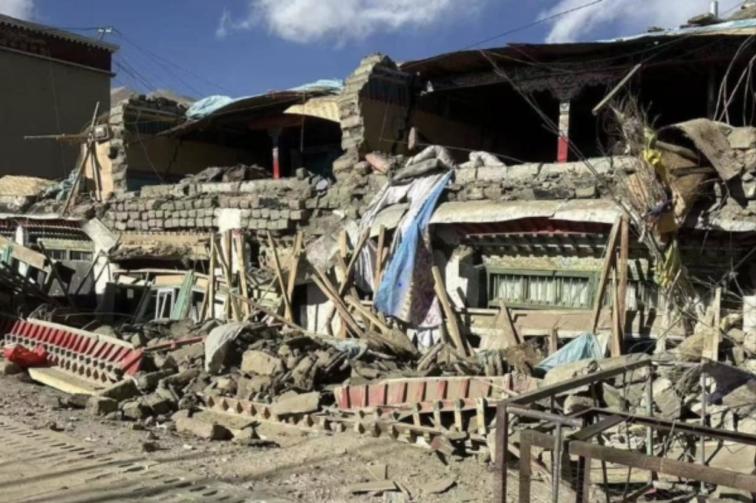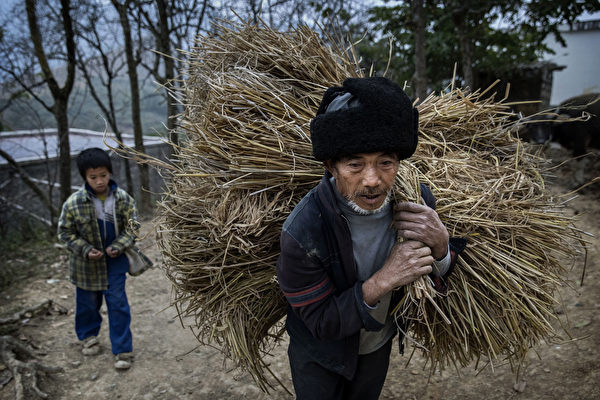(Video Screenshot Composite)
[People News] Recently, Hangzhou has been thrust into the centre of public attention due to two major events. One is the inheritance dispute and suspicious financial flows involving the children of Wahaha Group founder Zong Qinghou. The other, more alarming incident involves the contamination of tap water in Yuhang District since July 16—residents say they’ve been drinking sewage water for several days.
Both issues are water-related, but the tap water contamination directly affects daily life and public health, making it more severe and sensitive. In a tightly controlled society like China, such issues are particularly volatile.
Yuhang Residents Allegedly Forced to Drink Sewage Water
On July 16, residents of Liangzhu and Renhe Subdistricts in Hangzhou’s Yuhang District reported an unusual odour in their tap water. Some posted photos showing brown-yellow stains on washcloths after running tap water. Others used tissue paper to block the tap and found layers of thick, black, foul-smelling sludge after just 30 seconds.
A netizen, “Qiushui Youyou,” posted: “The water department didn’t notify anyone in time. I noticed a strange smell while cooking, thought the chicken had gone bad. But the more I washed it, the worse it smelled. I threw it away, but my hands still stank the entire night—it made me gag. The worst part is we already cooked and ate it. Just thinking about it is nauseating.”
A local blogger claimed she was lucky to have eaten out and not at home. When someone asked if she had showered in it, she replied, “Just imagine falling into a cesspit—that’s basically what it was. What’s the big deal? Didn’t you fall into a cesspit as a kid?”
Some residents reported skin irritation and stomach pains after using the water. Many began livestreaming their complaints on Douyin (China’s TikTok), and bottled water (like Nongfu Spring) quickly sold out in Yuhang.
Rumours circulated online that a contractor had mistakenly connected a sewage valve to the potable water network while repairing underground pipes. Workers allegedly discovered the error at 9 a.m. but tried to cover it up instead of reporting it, resulting in residents unknowingly consuming sewage water for half a day.
Authorities Deny Sewage Contamination
Officials denied these claims. On July 16, Yuhang Water and Environment Group stated that the main water supply had been restored by 4:30 p.m., though some residual water remained in the pipelines. They advised users to flush the taps before use.
On July 17, the utility company said it had switched water sources and flushed pipelines and secondary water tanks. Testing confirmed that water quality in the affected areas had returned to normal, and residents were advised to drain any remaining stagnant water. As compensation, each household would receive a five-ton water bill discount for July.
Officials did not explain the cause of the contamination. Online, sarcastic comments spread: “The stench has tourists drunk—Hangzhou is now Shitville.”
“The government is handing out sewage subsidies!”
On July 18, a police alert circulated online, alleging that a senior staff member of the water company named Liu had misconnected 13 pipelines from the city’s central district to the sewage network, affecting nearly 3 million people.
Police quickly denied this, calling it a rumour.
Government Final Ruling and Stability Maintenance Efforts
On July 19, the Yuhang District government issued a formal announcement calling the “sewage water” story an online hoax. It blamed the foul smell on sulfur compounds from anaerobic algae decay. Police have reportedly taken action against those spreading the “sewage water” rumour.
Yet, many residents insist the problem remains unresolved. Videos show tap water still orange in colour. Filtering it with tissue paper turns the paper yellow. Shower filter cartridges turn brown within 30 seconds.
One Zhihu user reported that only local testing centres deemed the water safe—external testing was required for reliable results. The situation echoed past incidents like the lead poisoning at a Gansu kindergarten.
A blogger mocked the government: “No explanation for the pollution, no emergency water stations, just ‘keep flushing your taps.’” One user said her water filters were completely ruined, and the 5-ton discount (about 14.5 yuan) was insulting. Her videos and posts were all deleted. “Is anyone actually fixing the problem?” she asked. That video, too, was quickly taken down.
Some argued sewage contamination was unlikely, as sewage and potable water systems are separate.
However, others noted: “Do you believe the lead poisoning in Gansu was from kids eating paint? Or that a university student in Chongqing drowned in a septic tank by accident? In China, nothing is too bizarre.”
One resident claimed to find toilet paper fragments and hair inside her faucet. Another joked, “My dog has been drinking so much water lately—is Hangzhou water the Maotai of the dog world?”
“Three-Water Integration” Project Turned Disaster; Similar Incident in 2020
What’s the real truth behind the Yuhang sewage water incident?
In order to pursue vanity projects and political achievements, the Chinese Communist Party (CCP) has promoted so-called "innovative projects," "smart cities," and "sponge cities" in urban development. Gao Weixing, Party Secretary and Chairman of Hangzhou Yuhang Environmental Water Group, began exploring the "Three-Water Integration" project in 2019—an initiative to unify the supply of potable water, rainwater, and sewage systems. That same year, he received Zhejiang Province’s highest water management honour, the “Dayu Cauldron Award.” In 2020, Gao piloted the Three-Water Integration system in parts of Hangzhou, and in 2021, he was awarded the May 1st Labour Medal by the city of Hangzhou.
Specifically, the "Three-Water Integration" refers to the unified and coordinated management of potable water, rainwater, and sewage systems, aiming to integrate these three types of water resources to avoid redundant infrastructure, reduce waste, and improve overall efficiency. To achieve this, the project requires a five-in-one management system covering planning, design, construction, supervision, and operation.
This necessitates the coordinated layout and unified management of three types of pipelines—potable, rainwater, and sewage. The system must maintain appropriate spatial separation and safety distances while enabling integrated management and maintenance. Each system should be able to function independently, yet also benefit from optimised resource integration. All pipelines are equipped with specialised valves and monitoring devices for controlling and monitoring water quality, pressure, and volume in different zones. These pipeline facilities are managed through a unified platform that enables information sharing and remote control.
Hangzhou Water Company’s “Three-Water Integration” and “Five-in-One” management model was first implemented in Yuhang District and later expanded to other areas such as Fuyang District and Jiande City. According to reports, by the 2023–2025 period, water system integration and the upgrading of village-level water stations in Yuhang, Fuyang, and Jiande had been fully completed.
By all accounts, this so-called urban water innovation project is extremely complex and carries significant risks. No other city internationally—or within China—has attempted such an approach. The CCP’s obsession with grandiose achievements, combined with officials' eagerness to please, has led to accidents—where innovation turns into disaster.
On July 26, 2020, in the picturesque town of Hubu in Shuangpu, West Lake District, Hangzhou, the local tap water anomaly became a hot topic due to its foul smell. On July 30, Hangzhou Water Group issued a notice stating that the cause was a violation of internal procedures at a local food waste disposal site, resulting in wastewater entering the municipal tap water supply.
According to expert analysis, the ammonia nitrogen concentration in the test samples was higher than the chemical oxygen demand (COD), indicating that the pollution originated from the wastewater treatment process—specifically the filtration tank (activated carbon tank). Among all processes, only the backflush water from the filter had ammonia nitrogen levels exceeding COD, confirming it as the pollution source.
On-site investigation revealed that due to improper operations by the facility, backflush water from the filtration tank had entered the system’s hot water return pipe, which was then connected to a backup water supply pipe (on-site, the valve was found to be open). This allowed the contaminated water to flow into the municipal water network.
This 2020 drinking water contamination incident in Hubu Village, Shuangpu Town, West Lake District, Hangzhou, affected over 1,600 people who suffered from diarrhoea, skin rashes, and other symptoms, seriously impacting public health. The direct economic loss exceeded 3 million yuan.
“Three-Water Integration” Linked to Xi Loyalist Zhou Jiangyong
From 2019 to 2021, Gao Weixing, Party Secretary and Chairman of Hangzhou Yuhang Environmental Water Group, vigorously promoted the "Three-Water Integration" project—integrating potable water, rainwater, and wastewater systems—during the same period that Zhou Jiangyong, a fallen member of Xi Jinping's faction, served as Party Secretary of Hangzhou.
Public records show that Zhou Jiangyong was appointed a member of the Zhejiang Provincial Standing Committee and Party Secretary of Hangzhou in May 2018, and remained in that role until his downfall on August 21, 2021. Zhou fell from power due to murky ties between himself, his family, and the investment network of Alibaba’s Jack Ma, who was then acting as a financial proxy for the Jiang Zemin faction. Jack Ma, having challenged Xi Jinping’s authority in the realms of internet platforms and finance, was beginning to face a political crackdown, and Zhou’s association with him inevitably implicated him.
It is likely that Gao Weixing’s Three-Water Integration project received approval and support from Zhou Jiangyong at the time. Without such backing from the then Party Secretary of Hangzhou, it would have been difficult for the project to proceed. Notably, Zhou Jiangyong’s partner in the Hangzhou administration, Xu Liyi, who served as Deputy Party Secretary, Party Group Secretary of the Municipal Government, and Mayor of Hangzhou from April 2017 to June 2019, later became Party Secretary of Zhengzhou in late 2019. There, he invested a staggering 50 billion yuan in a so-called “sponge city” project, which ultimately proved to be a shoddy vanity project. The result was the catastrophic July 20, 2021, Zhengzhou flood disaster, which led to the deaths of tens of thousands.
Both Zhou Jiangyong and Xu Liyi were part of the "New Zhijiang Army"—a political faction aligned with Xi Jinping during his time in Zhejiang. One was sentenced to death with reprieve, and the other was dismissed from office. Both were deeply invested in building political vanity projects and performance-based projects at the expense of public well-being, and both ended in disgrace.
For years, water safety incidents have been a major failure in the CCP’s governance of livelihood and social issues. Across numerous provinces and cities, such incidents have been ongoing and unresolved. One notable case was the "4.10" benzene contamination incident in Lanzhou in 2014, when benzene levels in tap water exceeded safety standards due to a single-source water supply. This led to mass panic buying of bottled water and exposed serious problems with water source diversity and quality oversight.
In 2014, China also saw two major water pollution incidents: the “3.02” Tuo River disaster in Sichuan and the Songhua River contamination in Jilin, both caused by the illegal discharge of industrial wastewater, severely affecting downstream drinking water safety. The direct economic losses amounted to several hundred million yuan.
In 2019, a chemical pollution incident occurred in Yancheng, Jiangsu Province. Toxic discharges from a chemical plant resulted in a citywide water outage and severe contamination of the water source. In 2024, another incident took place in Yuci District, Jinzhong City, Shanxi Province, where tap water contamination led to vomiting and diarrhoea among hundreds of residents.
Tap water contamination or water quality anomalies are primarily caused by illegal industrial wastewater discharge, misconnected pipelines, polluted water sources, and management negligence. Cities affected include Hangzhou, Lanzhou, areas in Sichuan and Jilin, as well as Jiangsu and Shanxi provinces.
The recent tap water contamination in Renhe and Liangzhu Subdistricts of Yuhang District occurred at a critical political juncture. On July 14–15, the CCP held a high-level Central Urban Work Conference in Beijing, with all central leaders and provincial-ministerial officials in attendance. Xi Jinping delivered an important speech, emphasising the development of so-called “beautiful” and “smart” cities. No sooner had the meeting ended than Hangzhou swiftly flipped the switch—turning drinking water into sewage—forcing millions of residents to collectively drink contaminated water, effectively turning the city into a "smart faeces-drinking city," echoing Xi Jinping’s utopian urban vision.
According to an insider, it’s fortunate that Xi Jinping’s Xiong’an New Area project stalled. Had the plan to relocate parts of Beijing gone ahead, it would have posed enormous future risks. Xiong’an was previously the world’s largest balloon production site, and many industrial wastes and toxic substances were buried deep underground by companies and officials. The land in Xiong’an has been heavily polluted by chemicals. Moving large populations there would inevitably lead to disaster sooner or later.
(Originally published by People News)










News magazine bootstrap themes!
I like this themes, fast loading and look profesional
Thank you Carlos!
You're welcome!
Please support me with give positive rating!
Yes Sure!